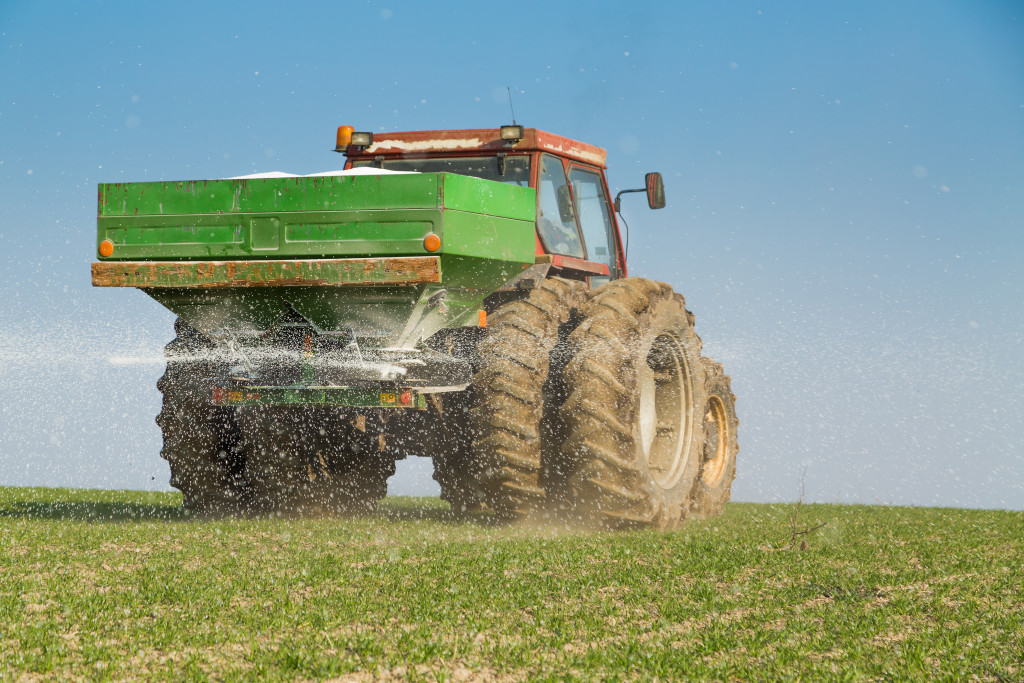- Heavy-duty machinery enhances sustainable farming, increasing efficiency and productivity and reducing manpower needs.
- Modern farming technology like GPS, automated irrigation systems, and alternative fuels reduce environmental impact.
- Versatile equipment like tractors, combo trailers, and harvesters support diverse farming tasks, contributing to sustainability.
- Effective pest management through targeted spraying and drone technology minimizes chemical use and environmental exposure.
In today’s world, sustainability has become increasingly critical. People are becoming more conscious of their environment and are looking for ways to live and work sustainably. One of the sectors that have embraced sustainability is the farming industry. Sustainable farming involves integrating environmental and social factors into farming practices. Heavy-duty machinery plays a vital role in sustainable agriculture, and this article seeks to explain that role.
Improved Farming Practices
Heavy-duty machinery is used to reduce the amount of time and effort required for farming. They improve efficiency and productivity while also reducing the need for manpower. This helps farmers achieve higher yields, reduce waste, and better manage resources like water and fertilizers. Here are some concrete benefits:
Precision Farming
Precision farming is a concept that heavily relies on heavy-duty machinery. It’s a modern farming technique that uses advanced technology and machinery to increase the quantity and quality of agricultural output while minimizing the farmer’s reliance on guesswork.
This approach involves the use of GPS mapping systems and satellite imagery to monitor crop yields and soil levels. It also includes the use of automated systems for irrigation, planting, and fertilizing, making farming more precise and controlled. As a result, precision farming promotes sustainability by minimizing waste and ensuring optimal use of resources.
Less Carbon Footprint
Heavy-duty machinery powered by alternative fuels such as biodiesel and electricity has a reduced carbon footprint. Biodiesel fuel emits significantly less carbon dioxide compared to traditional diesel fuel.
Similarly, electric farming equipment like tractors and combines produce zero emissions. Heavy-duty electric machinery is battery power, and the batteries can be recharged using solar or wind energy. Using these alternative fuels can reduce greenhouse gas emissions, preserving the environment and promoting sustainability.
Reduced Soil Degradation
Sustainable agriculture practices require that natural resources are conserved and that activities do not lead to soil degradation. Heavy-duty machinery, designed with precision and efficiency, can reduce soil degradation.
The use of precision farming methods helps ensure that the soil is not over-farmed and there is minimal soil erosion. Technology like no-tillage and cover crops reduce soil disturbance, increase soil biodiversity, and prevent soil erosion.

Versatile Equipment and Machinery:
In order to take advantage of these benefits, farmers need access to versatile, heavy-duty machinery that can be used for a variety of farming tasks. It’s essential to choose the right type of machinery depending on the needs of the farm and the size of the acreage. Here are some examples:
Tractors
Tractors are a mainstay of any modern farm, proving crucial for a variety of tasks such as plowing, tilling, and sowing seeds. They’re used in conjunction with various farm implements to carry out these tasks efficiently.
Tractors can be powered by biodiesel or electricity, further enhancing their contribution to sustainable farming. By reducing manual labor and increasing productivity, tractors can have a significant impact on the overall sustainability of a farm.
Stock Combo Trailers
Stock combo trailers are an essential investment for farmers, particularly those involved in animal farming. These trailers are designed to transport livestock from one location to another with ease, ensuring animal welfare during transit.
With various stock combo trailers for sale, farmers can select one that best suits their requirements in terms of size, weight capacity, and other features. Moreover, it’s a one-time investment that can improve the efficiency of operations and contribute to a more sustainable farming business model.
Harvesters
Harvesters are essential for gathering mature crops from the fields. They have revolutionized farming by drastically reducing the time and effort required for harvesting.
Modern harvesters are capable of doing multiple tasks simultaneously, like reaping, threshing, and winnowing. This efficiency minimizes the loss of crops and reduces the amount of waste produced. Some harvesters are now using alternative energy sources, leading to a reduction in carbon emissions and contributing significantly to sustainability in farming.

Effective Pest Management
Heavy-duty machinery also contributes to sustainable farming by improving pest management. Modern machinery like the spray boom, which uses targeted spraying, helps farmers save on herbicides and pesticides.
Targeted spraying reduces environmental exposure to pesticides and herbicides. Other equipment, like drone technology, can be used to improve pest management by detecting infestations early.
The use of drones leads to more targeted spraying, minimizing chemical use and reducing pests’ development of resistance.
Heavy-duty machinery plays an essential role in sustainable agriculture. By improving farming practices, minimizing the carbon footprint, reducing soil degradation, and improving pest management, farmers can achieve sustainable practices. The use of heavy-duty machinery is helping farmers increase efficiency, decrease costs, and minimize waste. As the world becomes more environmentally conscious, it’s essential for farmers to embrace sustainable agriculture practices to preserve and protect natural resources for future generations.




